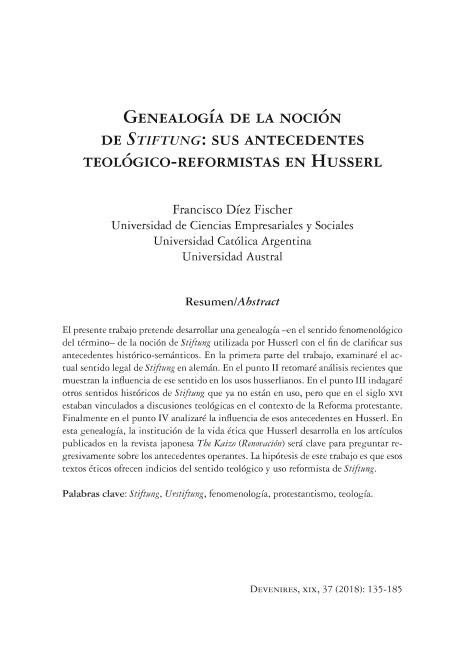Mostrar el registro sencillo del ítem
dc.contributor.author
Díez, Francisco

dc.date.available
2022-11-03T13:33:45Z
dc.date.issued
2018-05
dc.identifier.citation
Díez, Francisco; Genealogía de la noción de Stiftung: sus antecedentes teológico-reformistas en Husserl; Universidad Michoacana de San Nicolás de Hidalgo. Facultad de Filosofía; Devenires; 37; 5-2018; 135-185
dc.identifier.issn
2395-9274
dc.identifier.uri
http://hdl.handle.net/11336/176159
dc.description.abstract
El presente trabajo pretende desarrollar una genealogía –en el sentido fenomenológico del término– de la noción de Stiftung utilizada por Husserl con el fin de clarificar sus antecedentes histórico-semánticos. En la primera parte del trabajo, examinaré el actual sentido legal de Stiftung en alemán. En el punto II retomaré análisis recientes que muestran la influencia de ese sentido en los usos husserlianos. En el punto III indagaré otros sentidos históricos de Stiftung que ya no están en uso, pero que en el siglo xvi estaban vinculados a discusiones teológicas en el contexto de la Reforma protestante. Finalmente en el punto IV analizaré la influencia de esos antecedentes en Husserl. En esta genealogía, la institución de la vida ética que Husserl desarrolla en los artículos publicados en la revista japonesa The Kaizo (Renovación) será clave para preguntar regresivamente sobre los antecedentes operantes. La hipótesis de este trabajo es que esos textos éticos ofrecen indicios del sentido teológico y uso reformista de Stiftung.
dc.description.abstract
The aim of this paper is to develop a genealogy –in the phenomenological sense of the term– of the notion of Stiftung, as used by Husserl, in order to clarify its historicalsemantic background. In the first part, I examine the current legal sense of Stiftung in German. In section two, I review some recent analyses of this term that reveal the influence of this meaning of Stiftung in Husserl’s usage. Section three explores other historical meanings of Stiftung that have fallen into disuse, but were linked to theological discussions in the context of the Protestant Reformation in the sixteenth century. Finally, in part four, I analyze the influence of these antecedents on Husserl. In this genealogy, the institution of ethical life that Husserl developed in articles published in the Japanese journal The Kaizo (Renewal) are the key to clarifying, regressively, the operative background. The hypothesis of the paper is that those ethical texts offer clues to the theological meaning and reformist use of Stiftung.
dc.format
application/pdf
dc.language.iso
spa
dc.publisher
Universidad Michoacana de San Nicolás de Hidalgo. Facultad de Filosofía
dc.rights
info:eu-repo/semantics/openAccess
dc.rights.uri
https://creativecommons.org/licenses/by-nc-sa/2.5/ar/
dc.subject
STIFTUNG
dc.subject
INSTITUCIÓN
dc.subject
FENOMENOLOGÍA
dc.subject
PROTESTANTISMO
dc.subject.classification
Filosofía, Historia y Filosofía de la Ciencia y la Tecnología

dc.subject.classification
Filosofía, Ética y Religión

dc.subject.classification
HUMANIDADES

dc.title
Genealogía de la noción de Stiftung: sus antecedentes teológico-reformistas en Husserl
dc.title
Genealogy of the notion of Stiftung: its theological-reformist background in Husserl
dc.type
info:eu-repo/semantics/article
dc.type
info:ar-repo/semantics/artículo
dc.type
info:eu-repo/semantics/publishedVersion
dc.date.updated
2022-11-03T13:04:22Z
dc.journal.number
37
dc.journal.pagination
135-185
dc.journal.pais
México

dc.journal.ciudad
Morelia
dc.description.fil
Fil: Díez, Francisco. Academia Nacional de Ciencias de Buenos Aires. Centro de Estudios Filosóficos "Eugenio Pucciarelli". Sección Fenomenología y Hermenéutica; Argentina. Consejo Nacional de Investigaciones Científicas y Técnicas; Argentina
dc.journal.title
Devenires
dc.relation.alternativeid
info:eu-repo/semantics/altIdentifier/url/https://publicaciones.umich.mx/revistas/devenires/ojs/article/view/186
Archivos asociados
